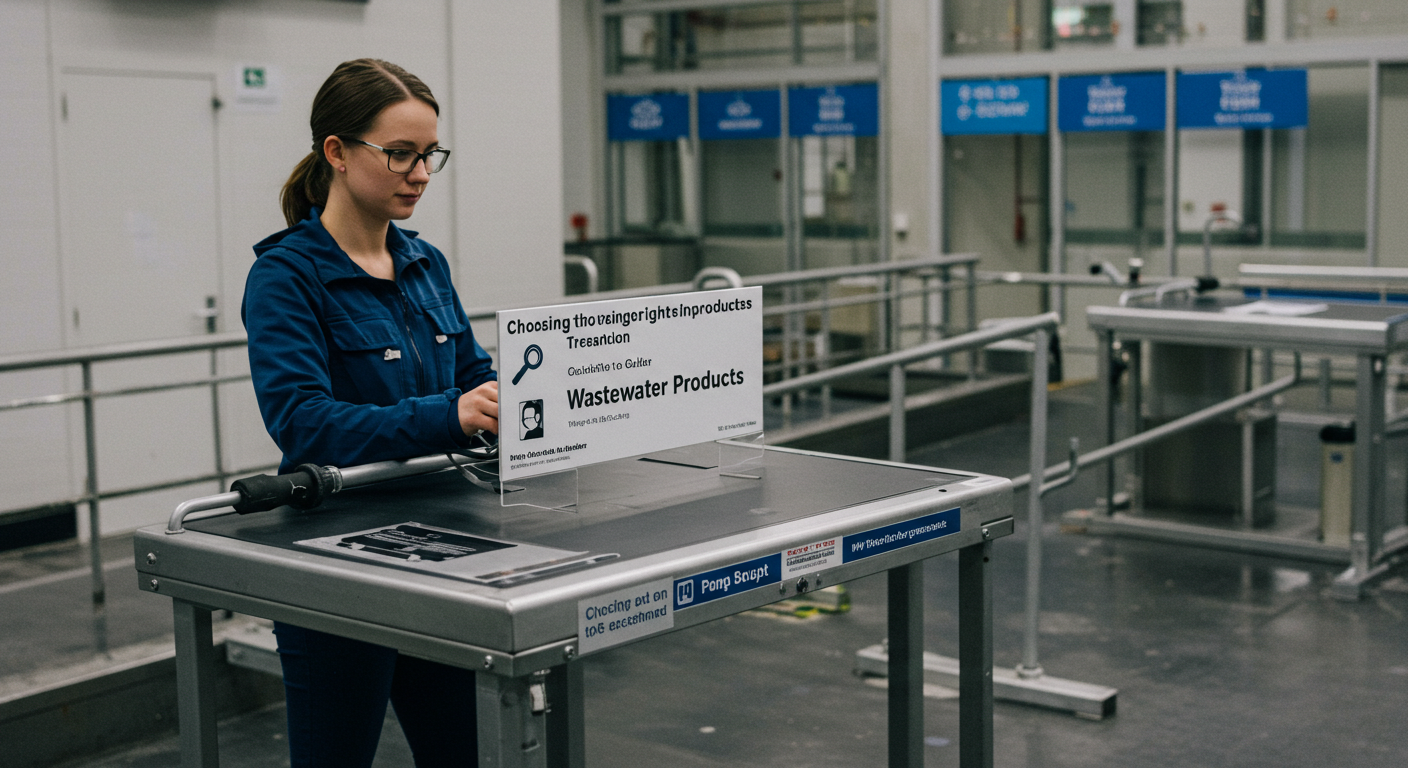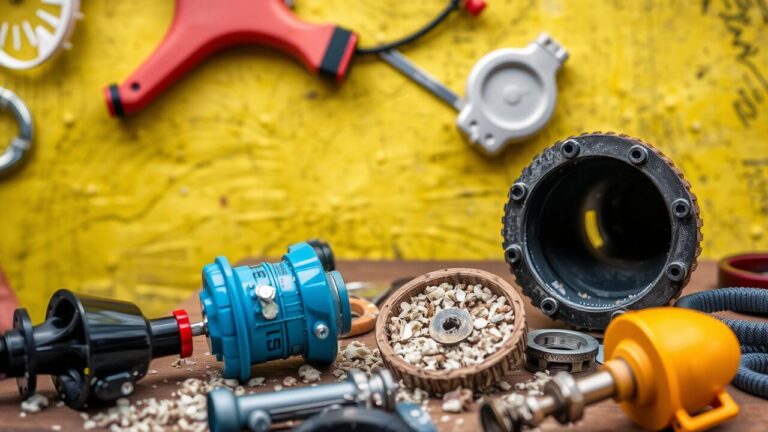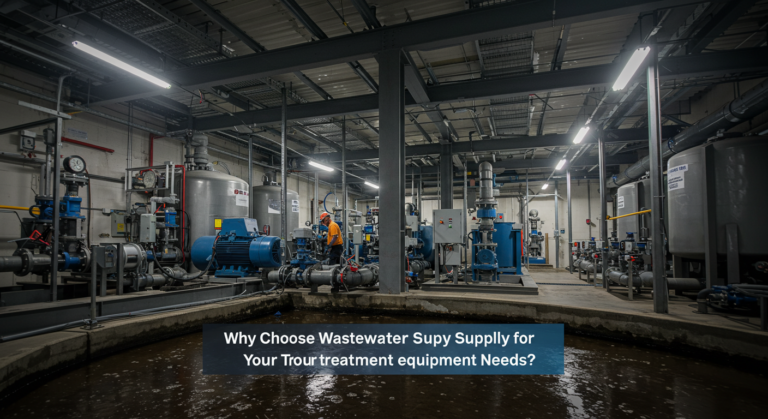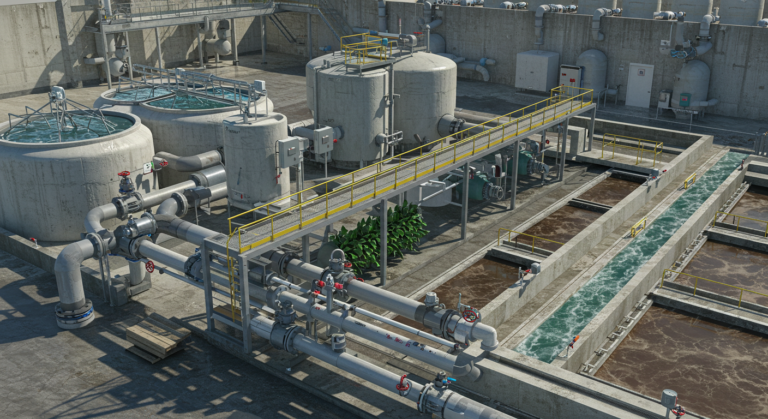Choosing the Right Wastewater Products: A Guide to Effective Treatment
Understanding the composition of wastewater is crucial for effective treatment and ensures the selection of appropriate solutions. Wastewater consists of various contaminants, including solids, nutrients, and pathogens that must be removed through well-designed wastewater treatment systems. Choosing the Right Wastewater Products: A Guide to Effective Treatment emphasizes the significance of characterizing wastewaters, whether they originate from domestic sources or industrial processes. The characteristics of untreated wastewater can significantly influence the efficiency of sewage treatment and the effectiveness of a wastewater treatment plant. Proper wastewater management hinges on this understanding, leading to the development of tailored strategies that improve the quality of treated wastewater and protect public health. By analyzing the specific needs of each wastewater source, including those from industrial wastewater treatment, operators can implement the most suitable wastewater treatment system for optimal results.
Choosing the Right Wastewater Products: A Guide to Effective Treatment | The Importance of Wastewater Characterization
Proper wastewater characterization is crucial for effective treatment in wastewater plants. Understanding the different components of industrial wastewater, including contaminants found in toilet wastewater, allows for better decision-making in selecting the right treatment products. This knowledge directly influences the efficiency of sewage treatment plants and their ability to provide cleaner water. Monitoring and analyzing sewage systems ensure compliance with the Clean Water Act, which aims to protect aquatic ecosystems and public health.
Effective water management hinges on accurate characterization of sewage types and their specific treatment needs. Choosing the right wastewater products becomes easier when operators know the unique properties of the waste being processed. Treatment methods vary significantly, from mechanical filtration to biological processes, and the goal remains consistent: to convert treated sewage into clean water suitable for reuse or safe discharge into the environment. Understanding these variables is essential for optimizing treatment solutions in any wastewater system.
Common Challenges in Wastewater Management
Wastewater management involves numerous complexities that can hinder effective treatment processes. One major challenge is the varied composition of wastewater, which can include industrial waste, contaminated water, and various waste products. Choosing the right wastewater products is crucial for optimizing water purification efforts. Without proper treatment solutions, achieving compliance with the Clean Water Act can be difficult, ultimately affecting water quality and availability in the water supply.
On-site sanitation solutions often face obstacles related to scalability and efficiency. Ensuring the safe reuse of water resources requires robust strategies to maintain cleaned water standards and address contaminated water risks. Additionally, balancing industrial and municipal wastewater treatment needs can complicate efforts to provide safe water. By focusing on innovative approaches and effective treatment systems, stakeholders can navigate these challenges while promoting sustainable water management practices.
- Understanding the varied composition of wastewater for tailored treatment solutions
- Ensuring compliance with environmental regulations like the Clean Water Act
- Implementing scalable on-site sanitation solutions for diverse settings
- Developing effective strategies for the safe reuse of treated water
- Balancing the treatment needs of industrial versus municipal wastewater
- Investing in innovative technologies for improved water purification processes
- Engaging community stakeholders in water management decisions to enhance collaboration
Types of Wastewater Treatment Systems
Understanding the different wastewater treatment systems is essential for addressing specific sanitation needs effectively. For industries using washing machines or generating significant organic waste, choosing the right wastewater products becomes crucial for efficient wastewater treatment. Each system is designed to handle various contaminants, including industrial chemicals and organic matter, ensuring safe disposal of treated water. Characterizing wastewater composition helps in selecting appropriate treatment methods that meet regulatory requirements while minimizing environmental impact. Choosing the right wastewater products: a guide to effective treatment can assist facility managers in navigating these complexities, ensuring that all wastewater treatment needs are met effectively and sustainably.
Overview of Individual Wastewater Treatment Solutions
Selecting appropriate wastewater treatment solutions is essential for achieving effective wastewater management. Numerous wastewater treatment products are available, each tailored to address different types of wastewater demands. Whether for municipal or industrial applications, choosing the right wastewater product ensures compliance with regulations and enhances overall system performance. Wastewater treatment professionals emphasize the importance of conducting a wastewater treatability study to determine the most effective processes for each situation, especially in manufacturing wastewater treatment scenarios.
Various individual wastewater treatment systems can cater to specific operational needs. Solutions range from conventional methods like activated sludge processes to advanced technologies such as membrane bioreactors. Each system offers unique advantages, which can cater to diverse expectations in the wastewater treatment industry. Implementing a tailored wastewater management strategy rooted in a thorough analysis of the wastewater treatment process can lead to improvements in efficiency and sustainability. Accessing resources, such as free wastewater treatment tools, helps stakeholders make informed decisions about their wastewater systems.
Comparing Centralized and Decentralized Wastewater Systems
Centralized wastewater systems typically involve collecting and treating water from various sources at a single, larger facility. This setup can offer economies of scale, enabling efficient management of resources and costs associated with wastewater management systems. However, centralized systems may face challenges in addressing the specific wastewater characteristics of diverse communities, leading to a more generalized treatment approach. Choosing the right wastewater products is crucial for ensuring thorough wastewater treatability and achieving effective treatment outcomes in these settings.
Decentralized wastewater treatment systems provide an alternative by treating everyday wastewater closer to the source. These systems are especially beneficial for rural or less populated areas where connecting to a centralized facility may be impractical. They often enable tailored solutions, allowing for a more nuanced approach to specific wastewater characteristics and individual sewage treatment needs. With the rise of innovative wastewater processes, decentralized systems can effectively address diverse wastewater challenges while promoting the release of cleaned wastewater back into the environment.
| Feature | Centralized Systems | Decentralized Systems |
|---|---|---|
| Location | Single facility serving multiple communities | Treat wastewater close to the source |
| Cost Efficiency | Economies of scale can reduce costs | Potentially higher initial setup costs, but lower long-term operational costs |
| Treatment Customization | Generalized treatment approaches | More tailored solutions for specific community needs |
| Infrastructure | Requires extensive piping and infrastructure | Less infrastructure needed; suitable for remote areas |
| Environmental Impact | Can lead to a large environmental footprint if not managed properly | Promotes direct release of treated water back into the environment |
Evaluating Wastewater Treatment Solutions
Choosing the right wastewater products is essential for effective treatment and management across various applications. Understanding the specific wastewater characteristics of your facility helps identify the most suitable sewage treatment systems. Wastewater applications can range from municipal to industrial, presenting unique challenges, especially concerning dangerous wastewater streams. The wastewater characterization process enables operators to tailor their approach, incorporating effective water treatment strategies, including the utilization of microbial wastewater treatment techniques. Efficient wastewater filtration processes are vital for enhancing wastewater purification and ensuring compliance with discharge standards. A robust wastewater infrastructure supports these efforts, allowing facilities to manage heavy loads and ensure treated effluents meet safety regulations. Careful evaluation of these elements is crucial for successful wastewater management.
Factors to Consider When Choosing Treatment Products
Selecting the appropriate treatment products is essential for achieving efficient water treatment. Understanding the specific needs of your operation helps in Choosing the Right Wastewater Products: A Guide to Effective Treatment. Evaluating wastewater media services and identifying feasible sewage solutions ensures that organizations implement the highest-quality wastewater bioaugmentation techniques. This consideration not only enhances the performance of individual sewage systems but also optimizes the processes involved in treating wastewater.
Consideration of the various water treatment systems available is critical for effective water management. Concrete wastewater machines often serve as reliable solutions, but the choice must align with the project’s scale and goals. The wastewater bioaugmentation journey involves integrating advanced methods to improve the quality of treated water. By focusing on effective waste water treatment options, organizations can secure sustainable practices and set the stage for future water treatment innovations.
The Role of Wastewater Filtration in Treatment
Filtration plays a critical role in achieving desired water quality within wastewater treatment processes. By effectively removing contaminants from turbid wastewater, filtration systems contribute significantly to comprehensive water treatment. This process not only helps in meeting regulatory standards set by the Clean Water Act but also ensures water is safer for various applications. As municipalities and industries focus on choosing the right wastewater products, effective treatment solutions like filtration become essential components of a central sewage system or independent sanitation solution.
Efficient treatment solutions can dramatically reduce the risks associated with pollution and protect the waste water supply. Incorporating advanced filtration technologies allows for better trust in waste water management. Washers and other treatment devices equipped with filtration capabilities play a vital role in ensuring that treated water meets the desired water quality. With a strong emphasis on efficient wastewater strategies, entities can enhance their overall sanitation practices while providing cleaner water for communities and industries alike.
| Filtration Technology | Removal Efficiency (%) | Application |
|---|---|---|
| Sand Filtration | 90-98% | Municipal Wastewater Treatment |
| Membrane Filtration | 95-99% | Industrial Wastewater Reuse |
| Activated Carbon Filtration | 85-97% | Contaminant Removal |
| Disk Filtration | 80-95% | Agricultural Irrigation |
| Microfiltration | 0.1-0.5 µm particles | Pre-treatment for Reverse Osmosis |
Ideal Wastewater Treatment Practices
Effective techniques for managing wastewater rely heavily on selecting the right treatment products tailored to specific waste applications. Choosing the Right Wastewater Products: A Guide to Effective Treatment emphasizes the importance of understanding the composition of certain waste products and their allowable concentrations. By integrating good cleaning practices with advanced chemical treatments, sanitation systems can significantly enhance treatment efficiency. Individual sanitation solutions can improve the overall treatment process, ensuring that all waste is adequately addressed. The implementation of proper washing techniques alongside appropriate treatment products is essential for achieving optimal results in any wastewater management strategy.
Effective Techniques for Releasing Wastewater Safely
Effective wastewater treatment requires a comprehensive approach to ensure that waste outputs meet environmental regulations. Choosing the Right Wastewater Products: A Guide to Effective Treatment emphasizes the importance of tailored treatment solutions that address specific treatment needs. A dedicated water system should be designed with adequate sludge removal requirements in mind to maintain treatment effectiveness. Implementing well-planned cleaning systems can significantly enhance the overall performance of treatment works, leading to successful treatment implementation.
Various treatment processes contribute to the efficient release of wastewater into water sources. Employing an effective treatment system not only focuses on removal efficiency but also integrates innovative strategies to optimize all aspects of waste systems. Understanding the intricacies involved in treatment solutions allows for better planning and execution of treatment works. By prioritizing the right choices in wastewater management, communities can ensure the long-term sustainability of their water resources while fulfilling their treatment needs effectively.
Innovations in Water and Wastewater Treatment Technologies
The evolution of water and wastewater treatment technologies highlights the need for effective solutions in managing diverse effluent types. Innovations such as the activated sludge methodology play a crucial role in optimizing the biological treatment process, making it more efficient for treatment purposes. These advancements also support proper treatment solutions for various applications, including leachate treatment, which addresses concerns from farm chemicals and improper disposal. Choosing the right wastewater products is essential for ensuring that water discharge meets environmental standards while facilitating efficient recycling.
Emerging treatment methods focus on integrating advanced technologies with traditional practices to enhance the performance of treatment systems. Non-collective sanitation systems are becoming increasingly popular, especially in rural areas, as they offer appropriate treatment systems tailored to local needs. The implementation of biological reactors has proven effective in addressing the challenges posed by ever-changing water systems, ensuring that wastewater is treated adequately before discharge. This alignment between innovation and practicality underscores the importance of choosing the right wastewater products: a guide to effective treatment for sustainable water management.
Wastewater Applications Across Industries
Wastewater management varies significantly between municipal and industrial applications, necessitating a tailored approach for effective solutions. Cities rely on centralized systems, such as city treatment plants and activated sludge plants, to handle large volumes of sewerage efficiently. Choosing the right wastewater products: a guide to effective treatment becomes crucial in specific treatment situations, where options may involve basic treatment methods or advanced treatment technologies. Industrial facilities often implement their own treatment system, utilizing non-collective sanitation devices and specific chemicals to manage waste materials effectively. The focus on achieving filtered water highlights the need for the right treatment system to suit diverse challenges, ensuring compliance and sustainability across different sectors.
Municipal vs. Industrial Wastewater Treatment
Municipal wastewater treatment focuses on managing the regular dirty water generated by households and businesses. The primary treatment process involves removing solids and larger particles, but secondary treatment solutions are crucial for addressing possible contaminations. A comprehensive treatment plant often employs various treatment systems, including soil-based treatment systems and advanced treatment methods, to ensure that effluent meets regulatory standards. Choosing the Right Wastewater Products: A Guide to Effective Treatment emphasizes the importance of selecting options that minimize chemical consumption while maximizing efficiency in the treatment process.
Industrial wastewater treatment, on the other hand, deals with wastewater from manufacturing and production processes. This type of wastewater often contains more complex contaminants, requiring specialized reactors and advanced treatment methods for effective treatment. Environmental goals become paramount in this context, as industries face strict regulations and potential environmental penalties for non-compliance. Companies must also consider the environmental impact of their operations and may choose biodegradable options to enhance sustainability in their wastewater management strategies. Common challenges treatment facilities face include adapting to varying wastewater compositions and ensuring regulatory compliance while maintaining efficient operations.
- Municipal wastewater treatment is primarily concerned with household and business-generated waste.
- Industrial wastewater treatment handles more complex contaminants from production processes.
- Both municipal and industrial treatments emphasize regulatory compliance to prevent environmental damage.
- Industries may opt for biodegradable treatment options to promote sustainability.
- Treatment facilities often face challenges such as changing wastewater compositions and maintaining operational efficiency.
- Both types of treatment utilize a combination of processes to achieve effective results.
- Selecting the appropriate treatment method is critical for maximizing performance and protecting the environment.
Conclusion
Choosing the Right Wastewater Products: A Guide to Effective Treatment emphasizes the significance of understanding specific treatment challenges faced by various industries. Selecting the appropriate equipment and chemicals tailored to unique wastewater characteristics is crucial for optimizing performance. Treatment systems help address these challenges by employing innovative solutions that enhance efficiency and effectiveness. A well-informed approach to choosing the right wastewater products ensures that the treatment system not only meets regulatory requirements but also promotes sustainable practices. This comprehensive understanding ultimately contributes to improved water quality across diverse applications.
FAQS
How can I determine the right wastewater treatment for overcoming wastewater challenges based on wastewater composition and characterizations?
To determine the right wastewater treatment for overcoming various wastewater challenges, it’s important to conduct thorough wastewater characterizations. Understanding the wastewater composition helps in selecting the ideal wastewater treatment that effectively addresses specific needs. A good approach is to evaluate options available in the wastewater treatment plants and consider domestic wastewater treatment solutions that comply with the Clean Water Act. By implementing appropriate water treatment methods based on your unique wastewater characteristics, you can ensure a well-managed wastewater system that results in clean water, ultimately making water safer for the community and the environment.
What role do wastewater characterizations play in selecting the most effective wastewater treatments for different discharge scenarios?
Wastewater characterizations are crucial in identifying the specific components and pollutants in the wastewater, which can significantly influence the choice of wastewater treatments. By understanding these characterizations, one can implement targeted cleaning water solutions that fit their own wastewater treatment needs. This process often includes conducting a water/wastewater treatability study to assess the efficiency of various treatments available in the wastewater industry. Additionally, considering non-collective wastewater treatment options may be beneficial for localized wastewater discharge challenges. Properly evaluating these factors contributes to achieving efficient waste water management, which ultimately improves water quality reduces harmful impacts on the environment and builds trust in wastewater solutions.
How can the wastewater treatment division help businesses with wastewater heavy processes and equipment chemicals?
The wastewater treatment division provides essential expertise for businesses dealing with wastewater heavy processes. They can recommend suitable equipment chemicals that improve treatment efficiency and ensure compliance with regulations. By trusting wastewater treatment professionals, businesses can optimize their processes and minimize environmental impact.
How can businesses trust their wastewater treatment solutions to effectively address their unique waste water challenges?
Businesses can trust waste water treatment solutions by conducting thorough evaluations of the service providers, reviewing their track records, and ensuring that the treatment processes are compliant with environmental regulations. Additionally, ongoing monitoring and adaptation of the treatment methods can help address any challenges that arise in the waste water management process.
What factors should be considered when selecting the best wastewater treatment products for unique treatment needs?
When selecting wastewater treatment products, it is essential to consider factors such as the specific composition of the wastewater, the treatment goals, regulatory requirements, and the technology’s effectiveness in removing contaminants. Additionally, understanding the characteristics of the wastewater will aid in identifying the most suitable products that can efficiently and effectively treat the unique composition and qualities of the wastewater.





